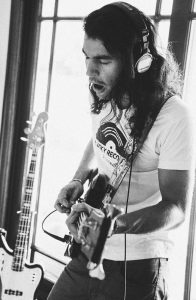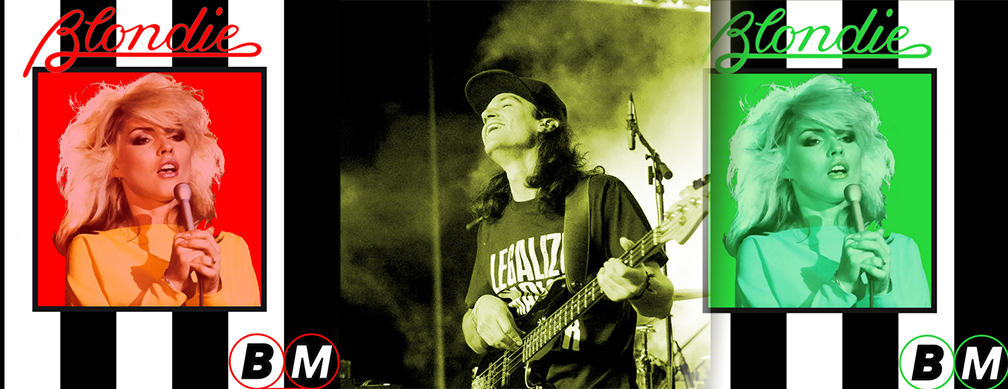By Keith Walsh
Over the past few years, Black Market Dub producer Nate Bridges has found a solid ally in multi-instrumentalist Brandon Niznik, aka Wise Owl. Located in Los Angeles, California, Niznik collaborates with Bridges across the internet, sending files back and forth to Nashville, even livestreaming the creation of their mini-masterpieces of dub remixes.
I had the chance to ask Niznik a few questions about his approach to dub, his choice of instruments, his work on the Black Market Blondie remixes, and his love for making music in general.
Synthbeat: How do you go from an aggressive, fast tempo groove like “Heart Of Glass” or “Call Me” to a reggae song? What kind of mental shift is involved?
Brandon Niznik: For me, the mental and emotional state while playing reggae is just as aggressive and intense as punk, rock, or metal. In all of those styles of music you’re trying to make a statement, and if you want to make that statement clear to the point of making an impression on a listener, then you have to play it with some amount of aggression and intensity. I understand that most people interpret reggae as being more chill or relaxed than other styles of music, but I can’t relate — to me it’s very in-your-face music.
Synthbeat: You play guitar and also do synth? I use Reason as well and found the organs quite excellent..so you modify the Hammond or other organs in Reason? How does that work?
Brandon Niznik: Yes — I use Reason for synth sounds, clavinet sounds, and for piano and organ sounds. In the case of synths, clavs, and pianos, I use Reason instrument patches that I’ve tweaked and customized to my liking. BUT for organ, I ALWAYS use a factory preset: the NN-XT preset “LOWEST DRAWBAR”. In my opinion, the only better organ sounds are from a real B3 and Leslie, or from a Korg CX-3 that costs at least a thousand dollars. The secret to making the NN-XT sound pop is to work the fast/slow with your mod wheel to pretend like you’re using a Leslie speaker. And, you may want to put some room reverb on it to add to the authenticity, since you can always hear the room in any B3 recording I’ve ever heard.

Synthbeat: What guitar do you prefer? Any affinity for Fender? Is there a substantial difference between brands?
Brandon Niznik: I only play Fender basses, but for guitars I prefer the double-humbucker, heavy-mahogany-body style. So for me, who has not had a lot of money for most of his life, that means Les Paul imitations. Almost every guitar recording of mine that you’ve ever heard would be one of three guitars: an Ibanez GAX70, an Ibanez GAX30, or a custom-made guitar that uses Ibanez GAX70 pickups. My brother is a big blues guitar player, and I learned to play guitar by sneaking his Stratocaster into my room. To me, the sound difference between a Fender guitar and a Gibson-style guitar is night and day. The Fender has a brass and twang and throaty or nasal quality that the Gibson-style doesn’t have. And since I’m always playing reggae, I prefer the glassy, full-bodied quality of the Gibson-style guitars.
Synthbeat: Any other comments about the creation of music in the studio, as opposed to playing live?
Brandon Niznik: Making music in the studio versus on stage is completely, fundamentally, astoundingly different. It’s like taking three years to make a movie versus performing your story in one night in a play. They’re actually opposites of one another in terms of time. When you play live, you spend hours and days and weeks preparing, practicing, and rehearsing the music over and over and it all leads up to one time that you get to play the music on stage, and then it’s over forever. It passes on into the past just like any other event in our lives. But when you’re recording, it’s reversed. You’re creating a thing that you know will live on and exist forever into the future. No matter what you do, this thing will always be out there, never aging, never changing. The world will change around it, but your recording will always be there for the future archeologists to dig up. And that can really be on your mind when you’re in the studio!
www.highnoonaudio.com
Blackmarketdub.bandcamp.com/
Black Market Dub On Patreon
BlackMarket_Dub on Instagram
High Noon Audio on Instagram
Wise Owl on Facebook
Wise Owl On Bandcamp
Horsemandrums.com
finis
